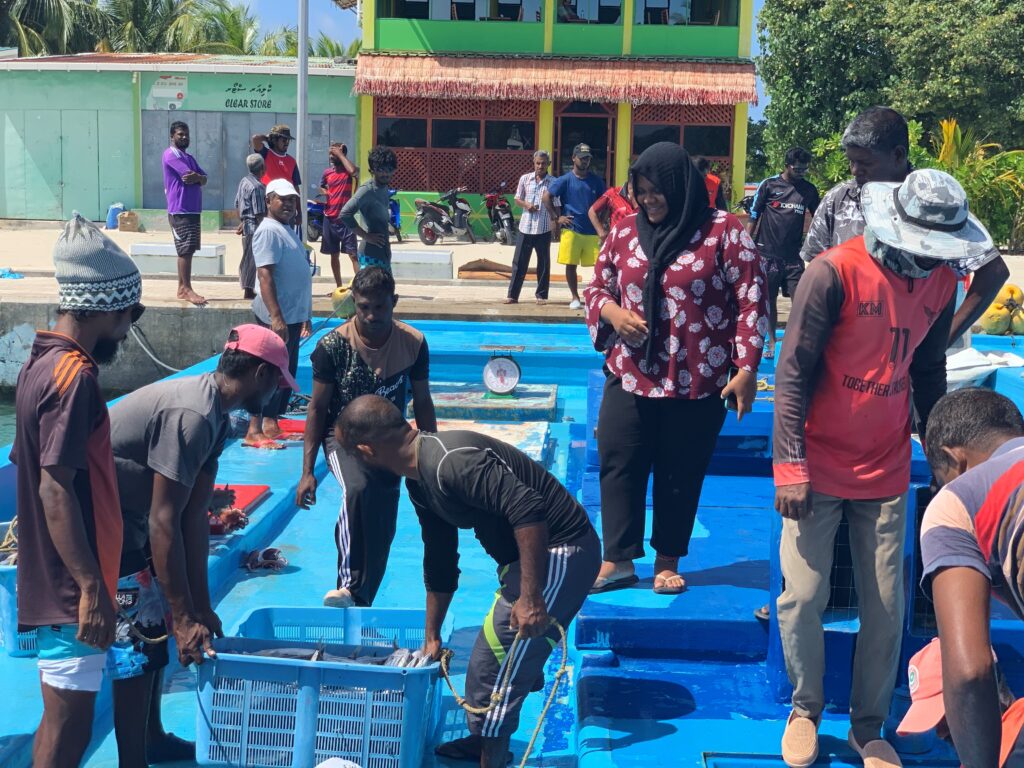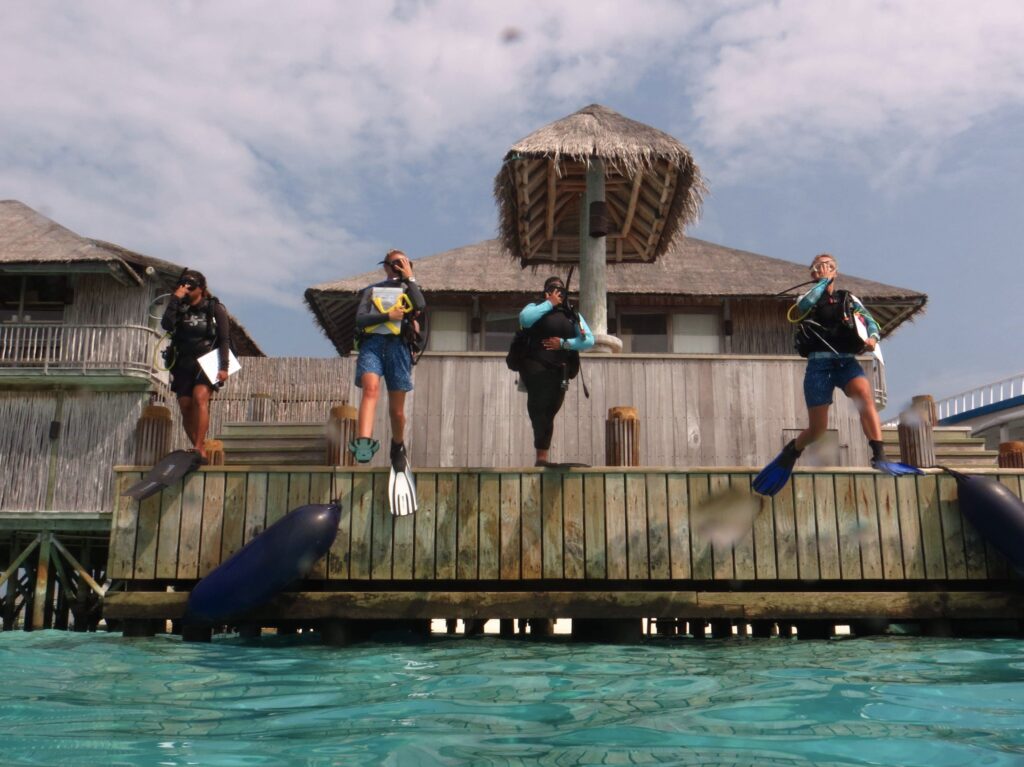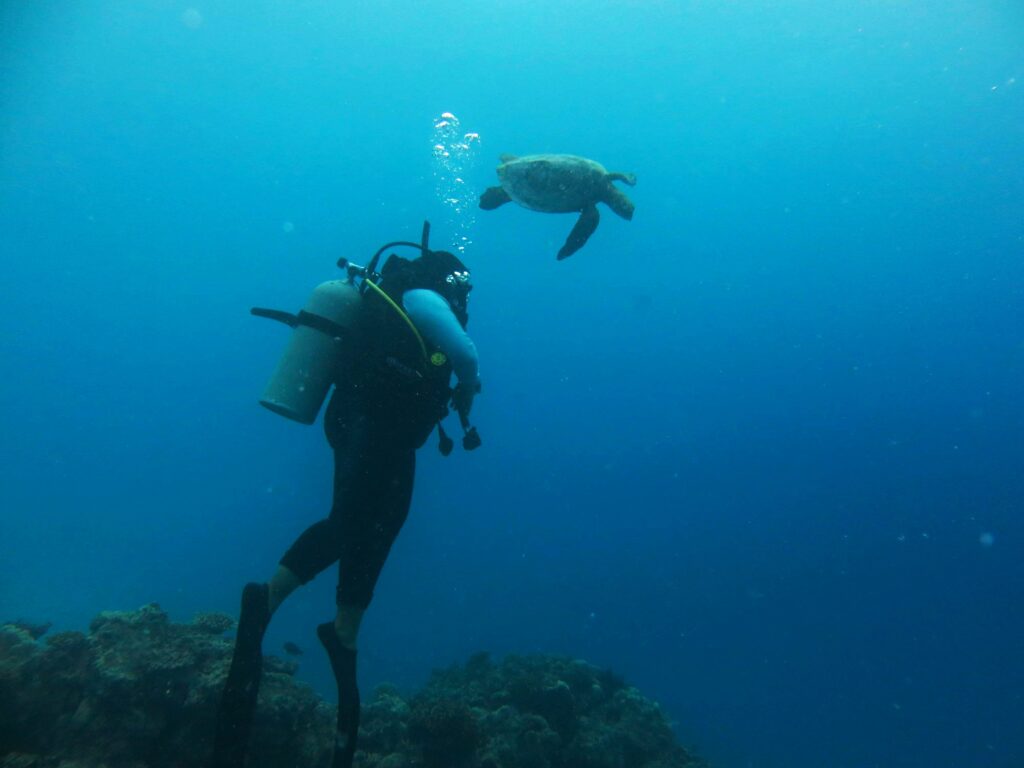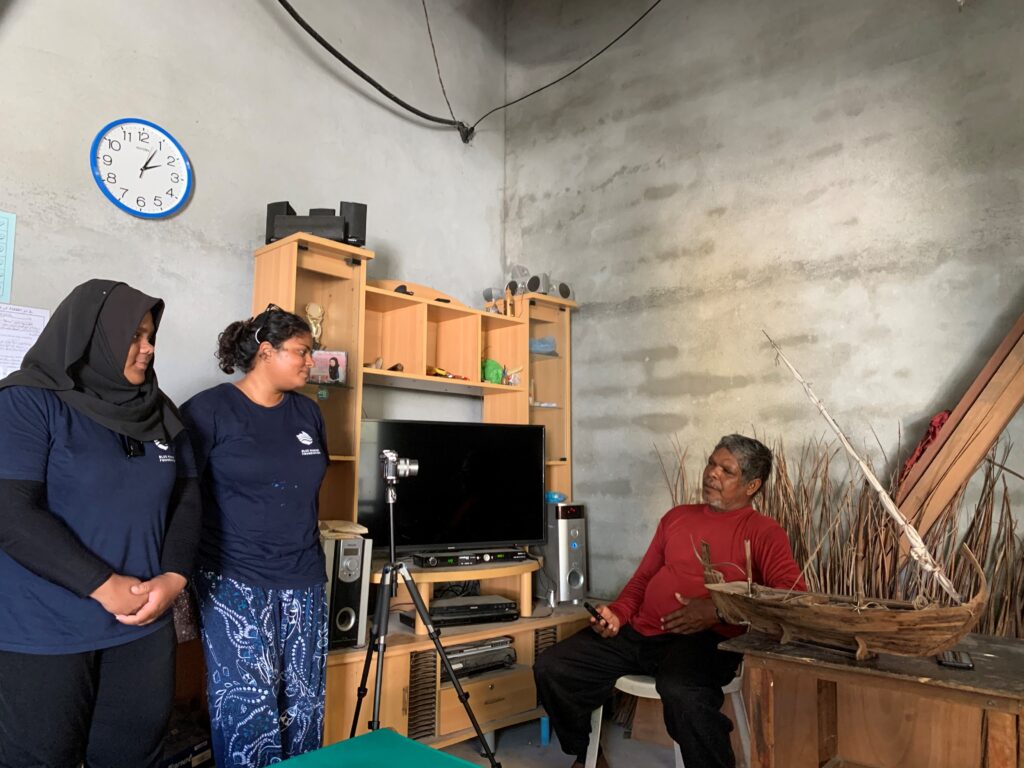Naff Asim, BLUE’s Resort Research and Fisheries Officer, gives a personal account of her experience pursuing a career in marine conservation as a woman in Maldives.
Maldives’ inshore waters contain some of the most biodiverse marine environments on the planet. Coral reefs and dense seagrass beds surround the oceanic islands, creating a safe haven for many marine species. From manta rays to turtles, Maldives has diverse megafauna that feed in these rich waters. Tourists fly from all around the world to see the Maldives’ marine wonders, yet for those living on the islands, this biodiversity is often inaccessible and not understood.
It may come as a surprise to many that, although Maldivian people grow up on small coral islands surrounded by water, many cannot swim and have not seen a coral reef. This is especially true for women, who are discouraged from swimming or snorkelling unless guided by a man. Women are not expected to work in male-dominated industries such as tourism and fisheries or to take part in “formidable” activities such as scuba diving.
Becoming a marine conservationist is often just a pipe dream for a Maldivian woman, as Maldives still has a very patriarchal culture. In fact, a career in marine science is not encouraged for men as it is not a highly esteemed career path in Maldivian society. Stigma against certain careers usually starts within the family, including mine. I had a hard time convincing my family that being a marine biologist or a marine researcher would not stunt my future and that I am more than capable of handling the pressures of such work, even as a woman. Even though my family is fully appreciative and supportive of my decisions now, many women in Maldives still hesitate to work in such fields that are believed to be inappropriate for women.

When looking at current opportunities in marine science, there are only two courses offered at the Maldives National University (MNU), the only university in Maldives. Before these courses were available, which has only been recently, there was no higher education environmental course in the country. Even within these courses, very little of the curriculum focuses on coral reefs or fisheries management. The course mostly teaches us about general topics of environmental management focusing on general introduction to marine biology but mainly covering coastal zones and their management. Therefore, young Maldivians who can afford it, study marine science abroad.
Internships are one of few opportunities available to us which enable us to find out more about our local environment. I was fortunate to work with many governmental and non-governmental organisations (NGOs) in Maldives. My first internship opportunity was with Blue Marine Foundation (BLUE), which they offered to university students, working on BLUE’s Grouper Fisheries and Conservation Project, based at Gaafu Dhaalu Thinadhoo. In the internship we were an all-female group – a challenging prospect when working with fishermen. Naturally, we faced criticism. I remember specifically one grouper fisherman verbally harassed us purely because we were women. Although it was a nasty experience, it only made me more determined to pursue a career in marine conservation. Why should I not be allowed to have an opinion about the management of my country’s marine resources?
During a trip to a nearby uninhabited island, I saw Sha and Viv (BLUE’s Maldives Project Manager and International Projects Manager) snorkelling and freediving on the coral reefs. I watched them remove an entangled ghost net from the reef. I could snorkel at this point, but I didn’t have the confidence that they had, and I craved it. I decided I wanted to learn to scuba dive so I could be confident underwater.

The internship with BLUE kick-started my career and enabled me to secure other training opportunities. A month later, I worked with the Banyan Tree Marine Labs and Maldives Marine Research Institute (MMRI) as a Marine Biology Intern to assist in coral reef monitoring data collection and assist the marine lab’s day to day activities, including projects conducted by PHD students. I also took part in many programmes conducted by the United Nations Development Program (UNDP), International Union for Conservation of Nature (IUCN), where I took part in environmental management workshops, community consultation, and assisted in raising awareness about sustainable development in Maldives. All of this experience helped me begin my advocacy journey on marine and environmental conservation.
Towards the end of my three-year degree, I got a second opportunity with BLUE to intern at Six Senses Laamu, to assist in the initial phase of their sustainable resort reef fishery project on Laamu atoll. This was when I finally got the chance to do my PADI Open Water course and to become an Enriched Air Diver. Seeing the reef and its inhabitants up close made me less fearful about this mysterious world and taught me to love and learn from the environment.

I have been able to continue to pursue for a career in marine conservation. I am now employed by BLUE, and the two inspiring women that I saw during my internship are now my colleagues. But for many, the lack of opportunities in marine conservation results in poor understanding of the marine environment and ultimately poor governance of it too. Internships for students, such as those that BLUE and other organisations and resorts offer, are critical for helping aspiring marine conservationists in Maldives but Maldives should not depend solely on external organisations and universities. Funding and resources need to be directed to the Maldives National University and the teaching of staff and students so that we have in-country capacity for marine resource management.
There needs to be a serious cultural shift in our belief system in Maldives whereby we recognise marine science as a viable and necessary career path for any young person, irrelevant of their gender. Educating the Maldivian community about the environment is vital to increase awareness of the effects of habitat degradation and, importantly, climate change. Geography has made the Maldives especially vulnerable to the consequences of climate change. It’s important that the community understand the importance of the marine environment’s role in mitigating these changes.
We are a big ocean state, marine conservation should be one of the most highly regarded jobs in our country. I am determined to make the Maldivian community aware of the discrimination women face in this field. I know that with time and experience, I can achieve this.



















